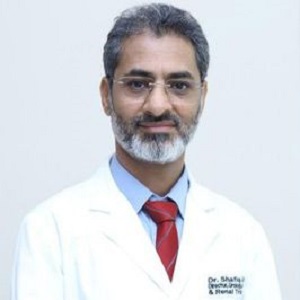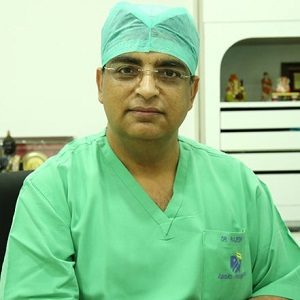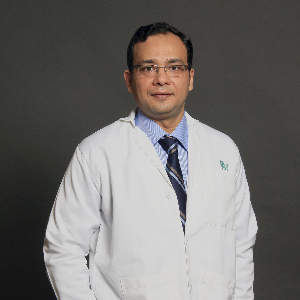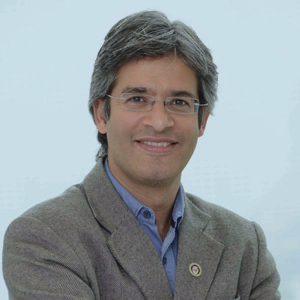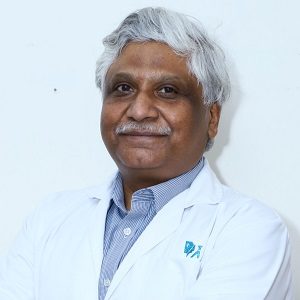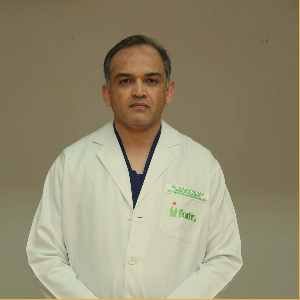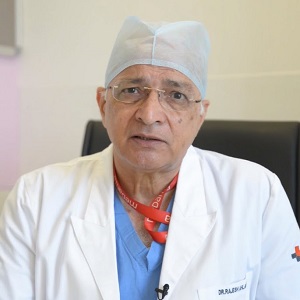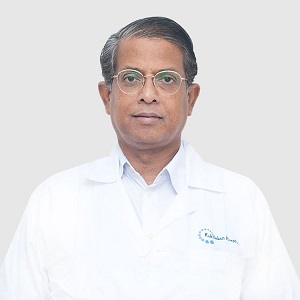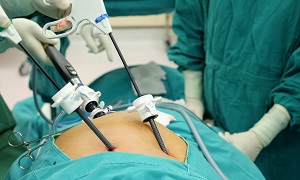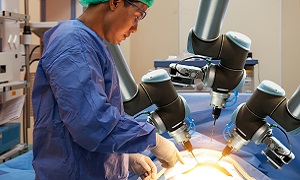Best Doctors in India for Cystectomy Surgery
- Director – Urology, Andrology & Renal Transplants
- 16+ years
Profile Highlights:
Profile Snapshot of Dr. Shafiq Ahmed
- With over 16 years of experience, Dr. Shafiq Ahmed is a highly skilled urologist and robotic surgeon.
- He has previously worked at some of the best hospitals in India and was instrumental in establishing Renal Transplant Programmes in some of the top hospitals within Delhi-NCR.
- Dr. Ahmed also holds US credentials as a robotic uro-oncologist.
- He has authored numerous book chapters and articles in medical journals on urological diseases.
- As one of the leading urologists, robotic surgeons, and renal transplant surgeons, Dr. Ahmed has trained many upcoming doctors in his field.
- He has also been a prominent speaker at various medical conferences.
- Robotic Urologist, New Delhi, India
- Over 27 years’ experience
Profile Highlights:
- Dr. Rajesh Taneja is one of the best Urologists in India, having experience of more than 27 years in the specialization. He is practicing at Apollo Hospitals, New Delhi as a senior consultant.
- Dr. Taneja specializes in surgeries to correct Congenital anomalies of urinary organs; Phimosis, PUJ Obstruction, Megaureter, Hydronephrosis, Vesicoureteric reflux (VUR), Hypospadias, Posterior Urethral Valves (PUV), Ectopia vesicae, and others.
- He is formally trained in the Robotic Surgical system and is one of the few urologists performing Robotic urological surgeries in India.
- Dr. Taneja has expertise in the Holmium Laser Enucleation of prostate technique.
- He has written numerous papers in national and international scientific publications.
- Dr. Rajesh Taneja also authored a book titled ‘Interstitial Cystitis’.
- Urologist, New Delhi, India
- Over 23 years’ experience
Profile Highlights:
- One of the outstanding doctors in the field of Urology, Dr. Anshuman Agarwal has spent 23+ years perfecting Robotic surgery and Laparoscopic surgery for urological cancer in India.
- He is an expert in minimal access surgery which includes Holmium laser surgery for Prostate (HOLEP) and PCNL, and RIRS for stones.
- Dr. Anshuman Agarwal has been a Senior Consultant in Fortis Hospital, RG Stone Hospital, and Rajiv Gandhi Cancer Institute and is currently functioning as a Senior consultant Urologist with Indraprastha Apollo Hospitals, New Delhi which is a state-of-the-art urology facility.
- Dr. Anshuman Agarwal has performed over 200 robotic surgeries for Prostate Cancer, Kidney, and Bladder and is known as one of the most renowned urologists in New Delhi.
- Uro Oncologist, New Delhi, India
- Over 20 years’ experience
Profile Highlights:
- Dr. Gagan Gautam is considered among the best Uro Oncology surgeons of the country and has performed more than 700 surgeries related to kidney, prostate and urinary bladder cancer.
- He has worked at the leading cancer centers of the world and also trained at some of the best cancer hospitals.
- Dr. Gautam is renowned for using robotic procedures during uro cancer surgeries and is among the very few doctors in India who are highly skilled in Robotic uro surgery.
- Urologist, New Delhi, India
- Over 30 years’ experience
Profile Highlights:
- Dr. Vipin Arora is a well-known Urologist in Delhi who has been practicing for more than 30 years with success.
- Currently, he is working as a senior consultant for Urology & Andrology at Apollo Hospital, New Delhi.
- Dr. Arora specializes in prostate diseases, Uro-Oncological surgeries, and laparoscopy procedures. He is the frontrunner in Robotically- assisted laparoscopic radical prostatectomy, Urologic oncology.
- Dr. Arora pioneered the Robotic Prostate Surgery technique in India.
- He also offers CAPD, Extracorporeal shock wave lithotripsy, Flexible Ureteroscopy, Laser treatment, Polycystic Kidneys treatment, Cadaver and Live Renal Transplant, GU prosthetics, Stress Incontinence surgery TVT TOT, and TURP.
- Pediatric Urologist, New Delhi, India
- Over 25 years’ experience
Profile Highlights:
- Dr. Sujit Chowdhary is one of the best Pediatric urologists in Delhi, India.
- He has been practicing for over 25 years and is currently working as a senior consultant for Pediatric Urology & Director of the Apollo Institute of Pediatric Sciences, New Delhi.
- Dr. Sujit Chowdhary also won many awards for his contributions to the field.
- The doctor and his team established a premier robotic pediatric urology program in the Asia-Pacific.
- His unit takes care of newborn surgeries, robotic surgery, minimally invasive surgery, and many other subspecialties of the field.
- Dr. Sujit Chowdhary’s published peer reviews and citations complemented his experiences. He has written about 90 peer reviews and 350 citations.
- Urologist, Gurugram, India
- Over 20 years’ experience
Profile Highlights:
- Dr. Rajiv Yadav is a reputed urologist in India with great experience in Prostate, Kidney & Urinary bladder disorders.
- His clinical focus is on Robot-assisted Laparoscopic Surgery for Prostate Cancer, Kidney Cancer, and Urinary bladder cancers.
- He completed his training at the most prestigious institutes including AIIMS, Delhi & Weill Cornell Medical & New York-Presbyterian Hospital, USA.
- Urologist, New Delhi, India
- Over 42 years’ experience
Profile Highlights:
- Dr. Suresh Kuamr Rawat is one of the best Urologists in India, having a grand experience of 42 years in the field.
- His services extend into prostrate laparoscopy, TUIP, TURP, minimally invasive surgery, etc.
- Dr. Suresh Rawat is practicing as a consultant with the Department of Urology at Apollo Hospitals, New Delhi.
- Dr. Rawat specializes in neuromuscular disorders, Andrology, and complex urological surgeries. He is an expert doctor for Endourology, Uro oncology, Reconstructive Urology, Female Urology, and Pediatric Urological treatment.
- Urologist and Renal Transplant Surgeon, Gurugram, India
- Over 40 years’ experience
Profile Highlights:
- Dr. Rajesh Ahlawat is one of India’s top kidney transplant surgeons, who has worked in leading Institutions in North India and has established successful Minimally Invasive Urology programs including Robotic Surgery and Kidney Transplant services with excellent outcomes comparable to the best in the world.
- Throughout his career, Dr. Ahlawat has initiated and established four successful Urology and Renal Transplant programs in India
- Urologist and Kidney Transplant Surgeon, Mumbai, India
- Over 30 years’ experience
Profile Highlights:
- With over 30 years of experience, Dr. Bejoy Abraham has worked as a consultant at premier institutes such as CMC, Vellore, and Addenbrookes Hospital, Cambridge, UK.
- He has vast experience in kidney transplant, management of kidney stones, cancer conditions of the bladder, reconstructive urology, erectile dysfunction as well as Pediatric urology.
Best Hospitals in India for Cystectomy Surgery
Indraprastha Apollo Hospital, New Delhi
- City: New Delhi, India
Hospital Highlights:
- Indraprastha Apollo Hospital is a 700-bedded multispecialty hospital in the heart of the capital of India. It is a part of Apollo Hospital group, one of India’s most reputed healthcare chains. Indraprastha Apollo Hospital has been accredited by Joint Commission International, making it the first internationally accredited hospital in the country in 2005.
- There are 52 specialties in the hospital with one of the best cardiology centers in the country. The hospital is also equipped with State of the art infrastructure facilities with the largest Sleep Lab in Asia and the largest number of ICU bed facilities in India.
- The hospital also has one of the largest dialysis units in India along with a dedicated Bone Marrow Transplant unit.
- The latest and highly advanced technologies that are installed in the hospital include Da Vinci Robotic Surgery System, PET-MR, PET-CT, Cobalt-based HDR Brachytherapy, Brain Lab Navigation System, Tilting MRI, Portable CT scanner, 3 Tesla MRI, 128 Slice CT scanner, DSA Lab, Endosonography, Hyperbaric Chamber and Fibro scan.
Fortis Memorial Research Institute, Gurugram
- City: Gurugram, India
Hospital Highlights:
- Fortis Memorial Research Institute is a multi-super-specialty, quaternary care hospital with 1000 beds. The hospital comprises reputed clinicians, and international faculty and is also equipped with cutting-edge technology. The hospital is a part of Fortis Healthcare Limited, a reputed chain of private hospitals in India.
- It is a NABH-accredited hospital that is spread across 11 acres of land and has a capacity of 1000 beds. The hospital has 55 specialties and is one of the premier health care centers in the Asia Pacific region popularly known as “the Mecca of Healthcare”.
- The hospital has 260 diagnostic centers and is also equipped with the latest and advanced techniques that include 3 Telsa which is the world’s first Digital MRI technology. The hospital also has world-class Radiation Therapy techniques which have been developed by leading technology experts from Elekta and Brain Lab.
Apollo Hospital, Chennai
- City: Chennai, India
Hospital Highlights:
- Apollo Hospitals, Chennai, is one of the best hospitals for heart care in India. Over the years, Apollo has expanded all over India, as a healthcare chain.
- India’s first ‘Only Pancreas’ transplant was performed in Apollo Hospital. The hospital is known for successfully performing Asia’s first en-bloc combined heart and liver transplant, and over the years, it has attained a remarkable achievement in the global healthcare space. Around 3-4 organ transplants are performed in the hospital per day.
- Equipped with over 500 beds, this hospital in Chennai was established in 1983 and since then has been among the most preferred hospital for patients from all over the world.
- The hospital holds accreditation of the NABH and JCI and is the first hospital in India to be ISO 9001 and ISO 14001 certified. It is also the first South Indian Hospital to receive subsequent reaccreditation from the JCI USA 4 times.
Medanta-The Medicity, Gurgaon
- City: Gurugram, India
Hospital Highlights:
- One of India’s best and largest multi-specialty hospitals, Medanta was built with the aim to bring India to the highest standards of medical care. The hospital has been providing the best medical services to its patients, since its inception, with care, commitment, and compassion.
- Equipped with 1250 beds, the hospital was founded by Dr. Naresh Trehan in the year 2009 with an aim to provide the best medical care at affordable costs. The hospital is spread across 43 acres and includes 45 operation theatres and 350 beds dedicated solely to ICU. The hospital includes over 800 doctors, and more than 22 specialty departments and has a dedicated floor for individual specialty in order to offer the best services under one roof.
- The hospital is considered one of the premier institutes in India for Cardiac Care and includes staffs and members of high caliber. The hospital has 6 distinct centers of excellence.
Max Super Specialty Hospital, New Delhi
- City: New Delhi, India
Hospital Highlights:
- One of the well-regarded providers in India committed to the highest standards of clinical excellence and patient care, Max Super Specialty Hospital is a part of Max Healthcare, which is the second-largest healthcare chain in India. Regarded as one of the most well-regarded healthcare providers in the country, Max Super Specialty Hospital is committed to the highest standards of clinical excellence as well as patient care. The hospital is also equipped with the latest technology as well as cutting-edge research. The hospital is known to deliver and ensure the highest level of patient care.
- The hospital has more than 500 beds and offers treatment for over 35 specialties. The hospital also holds the credit of having installed the first Brain Suite in Asia. This is a highly advanced Neurosurgical machine that allows MRI to be taken while surgery is ongoing.
- Other advanced and latest technologies are also installed in the hospital such as the 1.5 Tesla MRI machine, 64 Slice CT Angiography, 4D ECHO, LINAC, and 3.5T MRI machine.
Artemis Hospital, Gurugram
- City: Gurugram, India
Hospital Highlights:
- One of the most well-known hospitals in the Delhi NCR, Artemis Hospital is the first hospital in Gurugram to get accredited by the Joint Commission International.
- With more than 40 specialties, the hospital has been designed to be one of the most technically advanced hospitals in the country, with the best medical and surgical health care. The hospital has eleven special and dedicated centers, for Heart, Cancer, Neurosciences, etc.
- The latest technologies in the hospital include Endovascular Hybrid Operating Suite and Flat panel Cath Labs for the cardiovascular department, 3 Tesla MRI, 16 slice PET CT, 64 Slice Cardiac CT Scan, HDR Brachytherapy, and highly advanced Image Guided Radiation Therapy techniques (LINAC) are installed in the hospital.
- The hospital has won several awards as well, since its inception.
BLK Max Super Specialty Hospital, New Delhi
- City: New Delhi, India
Hospital Highlights:
- Equipped with 650 beds, BLK Superspecialty Hospital is the largest stand-alone private sector hospital in Delhi.
- With over 1500 healthcare providers and 150 globally renowned super specialists, the hospital is one of Asia’s largest Bone Marrow Transplant Centres. The hospital is known for having some of the best cancer doctors in the country.
- The hospital is NABH and NABL accredited and was inaugurated by the first Prime Minister of India. Pt. Jawahar Lal Nehru.
Kokilaben Dhirubhai Ambani Hospital, Mumbai
- City: Mumbai, India
Hospital Highlights:
- Kokilaben Dhirubhai Ambani Hospital, Named after the wife of Indian industrialist Dhirubhai Ambani, the founder of Reliance Industries, this is one of the top hospitals in Mumbai. This 750-bed multi-specialty hospital became operational in 2009. Known as one of India’s most advanced tertiary care facilities, the hospital is designed to raise India’s global standing as a healthcare hub, with an emphasis on excellence in clinical services.
- Kokilaben Dhirubhai Ambani Hospital uses Protocol and Care Pathway based treatment models to ensure the best outcomes for patients.
- The hospital represents a confluence of top-notch talent, cutting-edge technology, state-of-the-art infrastructure, and, most importantly commitment.
- The hospital also holds the accreditation of the NABH, NABL, CAP, and JCI.
- The hospital has been recognized as the No. 1 Multispecialty Hospital in Mumbai and the West Zone for the fifth year in a row in 2020 by The Week.
Rela Hospital, Chennai
- City: Chennai, India
Hospital Highlights:
- RIMC is a multi-specialty hospital in a sprawling area of 36 acres located in Chromepet, Chennai, Tamil Nadu, India.
- The facility has 450 beds including 130 critical care beds, 9 operating rooms, modern reference laboratories and radiology services, and is conveniently located near road, rail and air transportation.
- RIMC is led and managed by world-renowned physicians committed to healthcare.
- RIMC offers the broadest range of clinical care, education, and research. The hospital offers state-of-the-art technology and modern treatment facilities designed to provide health care at an affordable cost.
- Rela Institute is driven by patient needs, comfort and confidence.
CARE Hospitals, Hyderabad
- City: Hyderabad, India
Hospital Highlights:
- CARE Hospitals were established in the year 2000, by CARE Group.
- The multispecialty hospital has 435 beds, including 120 critical care beds, with an annual inflow of 180000 outpatients and 16,000 in-patients.
- The hospital provides specialty medical services in Cardiology, Cardiothoracic Surgery, Pediatric Cardiology, Pediatric Cardiothoracic Surgery, Neurology, Neurosurgery, Nephrology, and Urology.
- The hospital has the first dual source, 128 slice CT scanner (for high precision cardiac imaging) – the first of its kind in south India.
- The hospital offers a wide range of accommodation facilities for the convenience of its varied patient base, ranging from general wards to super deluxe rooms.
CYSTECTOMY
Cystectomy, which is also known as bladder removal surgery, is a surgery for removing the urinary bladder. In men, having the entire bladder removed usually includes the removal of the prostate as well as seminal vesicles. In cases of women, cystectomy involves the removal of the uterus, ovaries, and parts of the vagina.
A surgeon needs to create a urinary diversion as well, after removing the bladder. This is to store urine and have it leave the body. There are several ways that urine can be stored as well as eliminated after removal of the bladder. Your doctor is able to decide which method is the best for you.
Cystectomy is generally performed for treating invasive or recurrent noninvasive bladder cancer. Cystectomy might also be performed for treating any kind of other pelvic tumors.
Purpose
Cystectomy can be performed for several reasons. Some of them include:
- Cancer that begins in the bladder or that begins nearby and grows to involve your bladder
- Birth defects affecting your urinary system
- Neurological or inflammatory disorders affecting your urinary system
The type of cystectomy and reconstruction that will be performed can depend on several factors, such as the reason for your surgery, your overall health, etc. You can discuss with your surgeon which procedure is best for you.
Preparation
Before your procedure, you will need to discuss with your doctor regarding any medicines that you take or whether you use any caffeine, alcohol, or any such drugs. You might also need to make changes to your medications, or avoid certain substances to help with your recovery after the surgery.
If you smoke, it is best to quit it before your surgery. Smoking is a risk factor for bladder cancer, and it also increases any risk of developing problems after the surgery.
After your surgery is scheduled, you are going to receive specific instructions on how you can prepare for it.
Procedure
Depending on your condition, your procedure can be of two types:
Partial cystectomy
In partial cystectomy, only a part of your bladder is removed. Usually, lymph nodes nearby are also removed to determine whether any cancer has spread beyond your bladder.
Radical cystectomy
In a radical cystectomy, surgeons remove your entire bladder and the lymph nodes near it. Surgeons generally almost always cut the vas deferens and remove any prostate and seminal vesicles. For women, doctors generally remove the uterus, fallopian tubes, ovaries, cervix, and in some cases, parts of the vaginal wall.
Ways of surgery
There are generally three ways in which the surgery might be performed:
Minimally invasive surgery
Open surgery
Robotic surgery
You will first receive general anesthesia that helps to keep you asleep throughout the surgery. Once you are asleep, the surgeon will be cutting into your abdomen. In the case of open surgery, there will be one large incision, while in the case of minimally invasive or robotic surgery, there will be several smaller incisions.
Next, your surgeons remove the bladder along with the lymph nodes nearby. Your surgeon might also need to remove other organs near the bladder including the urethra, prostate, and seminal vesicles in men. In cases of women, it includes the urethra, uterus, ovaries, and parts of the vagina.
After your bladder is removed, your surgeon will need to reconstruct the urinary tract so that urine can pass the body. This can be done in various ways.
- Ileal conduit- In this method, the surgeon disconnects a short portion of your small intestine known as the ileum. The ureters, i.e. the tubes carrying urine from the kidney to the bladder, are attached to one end of the ileum. The other end of the ileum can be attached to an opening in the skin which is known as a stoma. The stoma is generally located close to your belly button on your right side. For collecting urine, a plastic appliance, known as an ostomy bag is placed over the stoma.
- Continent cutaneous diversion- In this method, your surgeon creates a reservoir for storing urine from parts of your small and large intestine. The ureters are attached to one end of the reservoir. The other end of the reservoir is meanwhile connected to a small opening known as a stoma, in the skin of the abdomen. The reservoir is able to store urine and it needs to be emptied periodically by inserting a small drainage tube known as a catheter into the stoma. There is a need for an external bag.
- Neobladder- In this method, your surgeon uses a long piece of the small intestine for creating a reservoir for storing urine. These ureters are attached to one end of the reservoir, while the other end of the reservoir is connected to your urethra, the tube carrying the urine out of your body. You can empty your reservoir periodically by relaxing the pelvic muscles and tensing the abdominal muscles.
After the Procedure
You might require staying at the hospital for around five-six days after your surgery. This time is generally required so that your body is able to heal from the surgery. The intestines tend to be the last part to be awake after the surgery, and therefore you might need to be in the hospital until the intestines are again ready for absorbing fluids and nutrients.
On the day after the surgery, your healthcare team will likely have you get up and walk. Walking can help to promote healing and it can also help your bowel function to return. It improves your blood circulation as well and also prevents joint stiffness and blood clots.
You might also experience some pain or discomfort around the incision or incisions for some weeks after your surgery. As you continue to recovery, your pain is going to get better gradually. Before you get discharged from the hospital, you will need to talk with your doctor about medications and any other ways to improve your comfort.
It is also likely that you will be seeing mucus in your urine since the piece of intestine used in the procedure will still be making mucus like the intestines normally do. Over time, you will be seeing less mucus in your urine, though it is likely that it will never go away completely.
Few weeks after your surgery, you will likely need to return for follow-up appointments. Your doctor will check to make sure that your upper urinary tract drains adequately and you don’t experience any electrolyte imbalances.
If the cystectomy was performed for treating bladder cancer, your doctor will be recommending regular follow-up visits for checking for the recurrence of cancer.
During the first two months after the surgery, it is best if you can restrict some activities such as lifting, driving, bathing, and going back to your regular routine. Gradually, you will be regaining your strength, and your energy level will increase. You can also discuss with your doctor when it is safe to resume sexual activities.
Risks
Like all major surgical procedures, a cystectomy poses a few risks, which includes:
- Bleeding
- Blood clot infection
- Organ damage
- Reactions to anesthesia
It is likely that you will be seeing changes in how you urinate after any bladder surgery. Your bladder is smaller after partial cystectomy, and therefore you might need to go to the bathroom more often. If you have a radical cystectomy, your ability to urinate will be depending on the type of reconstructive surgery that you have.
For some men, bladder removal surgery can cause sexual side effects as well. Some men might experience difficulty getting and maintain erections. Also, men will not produce semen anymore, as the doctor removes the seminal vesicles along with the bladder.
Women can also experience some sexual side effects. Though intercourse is still possible, it can cause discomfort if doctors remove parts of the vagina. Some women can also have nerve damage, and this damage can limit a woman’s ability to become aroused and have an orgasm.

